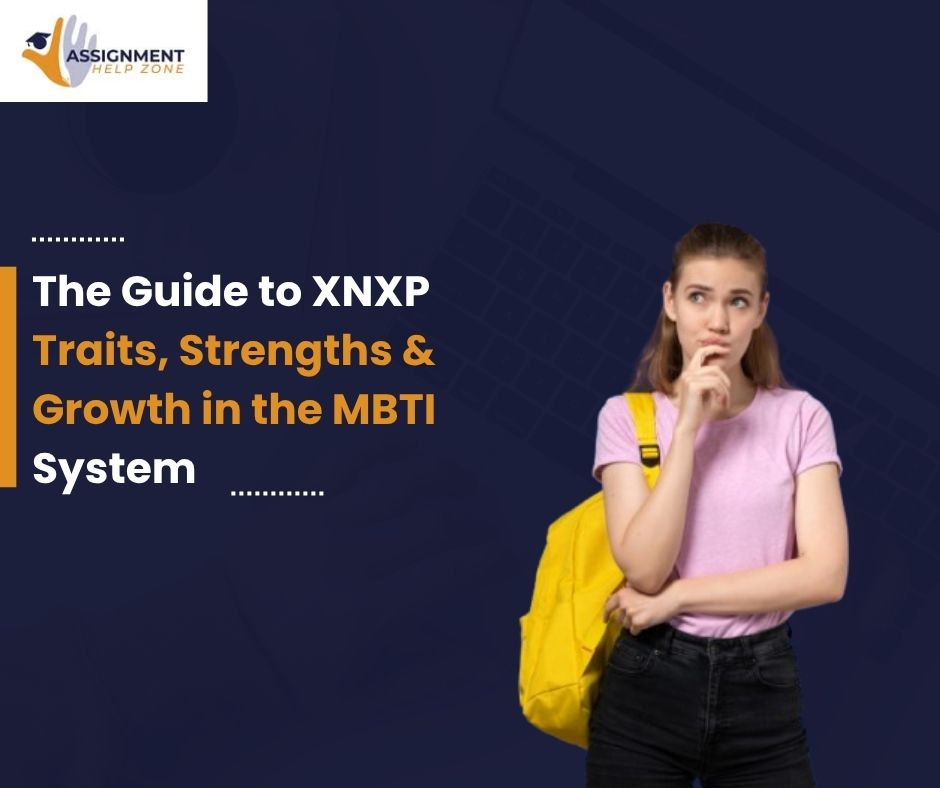Things keep popping up in the very dynamic world of psychological models; on the other hand, the Myers-Briggs Type Indicator (MBTI) still offers deeper insight into people’s personality. You’ve come across these short forms called “XNXP”; then you don’t need to worry, because you’re not the only one. This handy fill-in actually shortens by four if the MBTI types ENTP, ENFP, INTP, and INFP are mentioned. Understanding XNXP personality traits can be especially beneficial for students diving into personality psychology—and even more so if you’re searching for psychology assignment help.
This in-depth guide is intended to delve deeply into XNXP personality types, contrast subtypes such as ENTP vs ESTP, and put the spotlight on how these tendencies relate to your educational, professional, and personal growth. Analysing data for a research paper or studying self-knowledge, knowing your type is an asset.
What Is the XNXP Personality Type?
The XNXP title is not a formal MBTI name but a composite designation given to individuals with general traits of Intuition (N) and Perceiving (P). The prefix “X” refers to unknown in the Introvert (I) and Extravert (E) axis. It includes: ENFP – Extraverted, Intuitive, Feeling, Perceiving, ENTP – Extraverted, Intuitive, Thinking, Perceiving, INFP – Introverted, Intuitive, Feeling, Perceiving, and INTP – or Introverted, Intuitive, Thinking, Perceiving.
These are extremely curious, such as for novelty, and are driven by a learning need. If you’ve just taken the XNXP personality type test 2024, your report may assist you in revealing patterns in your decision-making, emotional reactions, and drivers of motivation.
Defining XNXP Personality Traits
The XNXP personality group refers to individuals who possess Intuition (N) and Perceiving (P) preferences in the MBTI system. The “X” signifies flexibility between introversion and extraversion—which is, you might tip either direction. But then, typically, such forms as ENFP, ENTP, INFP, and INTP fall within this category, and they are marked off by great creativity, independence, and curiosity.
Core Personality Traits of XNXPs
People with XNXP traits typically thrive on abstract thinking. They are idea-centered and tend to be more interested in possibilities than in facts. You’ll often find them chasing after ideas that others believe are too theoretical or too impractical.
Another dominant trait is their open-mindedness and flexibility. Unlike Judging types, who prefer clear plans, XNXPs resist rigid systems. This makes them extremely adaptable but occasionally inconsistent with routines.
Their originality and creativity excel in problem-solving, innovation, and storytelling. Most inventors, writers, and artists share this personality cluster.
Emotionally, even the more logical types, like INTPs, can display strong emotional insight. This makes them capable of understanding others on a deep level.
A Natural Drive for Exploration
XNXPs often get bored with routine. Their investigatory and restless nature makes them oscillate from one project, pastime, or concept to another. It is creative, but it also leaves projects incomplete. If this sounds like you, the XNXP personality traits test can give more clarity.
In summary, XNXPs are dynamic thinkers who crave intellectual freedom, emotional depth, and the space to grow on their own terms.
A Closer Look: ENTP vs ESTP
It’s common to confuse certain MBTI types, especially when they share two or three letters. A hot topic in forums is ENTP vs ESTP. While both are energetic and love action:
- ENTPs are idea-driven innovators, always theorising or analysing future possibilities.
- ESTPs are real-time actors, rooted in what’s practical and present.
ENTPs are more likely to chase startup ideas or explore fashion marketing dissertation topics, while ESTPs excel in sales or high-pressure operational roles. Imagine two professionals at Vodafone Chelmsford—one strategising the next campaign (ENTP), and the other leading the executional frontlines (ESTP).
Exploring the Rarest Personality Types
Among the 16 MBTI types, INFJs are considered one of the rarest personality types. Their structured empathy, introspection, and visionary thinking distinguish them. While XNXPs are not as rare, they are incredibly complex. Their blend of openness, flexibility, and idealism makes them equally intriguing.
If you’re comparing with INFJ types, notice how INFJ characteristics are more inward-focused with a preference for organisation. XNXPs, by contrast, are outward-exploring and spontaneous. Still, both value authenticity and depth in relationships.
XNXP Strengths and Weaknesses in Academic Life
Academically, XNXPs often excel in subjects that allow flexibility—philosophy, literature, psychology, and design. But they may struggle with deadline-oriented tasks. Resources like BTEC assignment examples can help provide the structure they naturally resist.
Many XNXPs find traditional education limiting. That’s why they prefer platforms that offer customisation and may find helpful services with good assignment help zone reviews. They’re also known for switching dissertation topics or majors due to fluctuating interests.
ENFP-T Careers and INTP Paths
Career choices for XNXPs reflect their personalities:
- ENFP-T careers might include creative writing, motivational speaking, therapy, or public relations.
- INTP career routes may include software engineering, architecture, or academic research.
Both types value autonomy and dislike micromanagement. They thrive in innovative environments—think startups, research labs, or creative agencies.
INFP and INFJ Comparison
Though INFP personality traits overlap with INFJs in depth and empathy, the key difference lies in structure:
- INFPs are spontaneous and value emotional authenticity.
- INFJs are structured, with long-term visions and detailed planning.
INFP relationships tend to be dreamy and idealistic. These individuals look for deep emotional connections and personal meaning. This is also true for other XNXPs, especially in personal and romantic contexts.
Personality Tests and Self-Discovery
Giving tests such as the ENFP personality test or the ENTP personality test can offer deep insights. Even if you tried the XNXP personality type test 2022 free download, revisiting your results can highlight changes in thought patterns and behaviour.
Many platforms offer variations of these tests, ideal for exploratory assignments or even reflective essays. This also ties well into fields like nursing, making personality typing a useful starting point when brainstorming dissertation topics nursing.
Researching XNXP Personalities Academically
Analysing XNXP personality traits from an academic standpoint presents a broad spectrum of research opportunities. Whether you are doing a psychological case study, authoring a dissertation, or creating a report, adequate referencing and citation are essential in order to ensure academic integrity.
Why Referencing Matters in Personality Psychology
In academic writing, thoughts should not be merely expounded but must be backed by credible sources. When exploring personality frameworks like MBTI, especially lesser-defined subgroups like XNXPs, referencing becomes essential to support theories and distinguish between original thought and established research. Many university programmes, especially in psychology or education, require strict adherence to referencing formats—most commonly, the Harvard style.
Bradford Harvard Referencing: A Structured Format
The Bradford Harvard referencing system uses detailed citation formatting, including the publisher’s name, date of publication, and retrieval links or access dates for digital sources. It’s especially useful when referencing older or less commonly cited MBTI studies or personality assessments.
Leeds Harvard Referencing: Digital-Ready Guidelines
If you’re sourcing materials from online articles, blogs, or test platforms like the XNXP personality type test 2022 free download, the Leeds Harvard referencing website and its detailed Leeds Harvard referencing examples are essential tools. They provide digital-specific citation rules and help structure online sources for clarity and uniformity in your assignments.
Cardiff Harvard Referencing: Emphasis on Clarity
Known for its clean and consistent formatting, Cardiff Harvard referencing ensures your citations are easy to read and verify. This version is especially helpful in psychology research papers where multiple sources, including books, journals, and online tests like the XNXP personality type test online, are referenced in a single work.
Referencing Templates from Top Universities
Both the Harvard referencing University of Sheffield and the University of Birmingham Harvard referencing styles offer extensive guides for students working on dissertations or long essays. These formats can be helpful if you’re citing resources like MBTI theory books, BTEC assignment help examples, or platforms reviewed in myassignmenthelp reviews.
Intuitive vs Observant: A Critical MBTI Axis
One of the most pivotal comparisons in MBTI theory is Intuitive vs Observant:
- Intuitive (N) types seek patterns, meaning, and abstract concepts.
- Observant (S) types focus on what is real, practical, and current.
All XNXPs fall into the intuitive category. They look for possibilities over facts, interpret symbolism, and explore “what could be” rather than “what is.”
ENTP Personality Characters in Fiction and Media
Popular media showcases ENTP personality characteristics like:
- Tony Stark (Iron Man) – Inventing, sarcastic, and constantly brainstorming
- Jim Halpert (The Office) – Playfully smart, with an attitude against authority
- Tyrion Lannister (Game of Thrones) – Tongue-lashing and tactical
These are excellent case studies in leadership, flexibility, and moral nuance that make them perfect references for essays or class discussions.
Balancing Personality with Career Growth
The best way for XNXPs to grow is by balancing their natural spontaneity with a bit of structure. Strategies that help include scheduling creative work in time blocks, setting flexible but clear deadlines, using journals and habit trackers, and seeking accountability partners or mentors.
These practices can support both personal and professional development while also making academic tasks more manageable.
Wrapping Up
Whether you’re an ENTP debating tech entrepreneurship, an INFP journaling your way through self-discovery, or an ENFP chasing a dozen passions at once—being an XNXP means embracing complexity. These types are not easy to categorise, but that’s their strength. They adapt, evolve, and innovate.
With the right tools—whether that’s understanding ENFP personality through tests, exploring fashion marketing dissertation topics, or applying the Leeds Harvard referencing website—XNXPs can truly thrive.
So, if you’ve taken the XNXP personality traits test or even tried the XNXP personality type test 2022, don’t just stop at the result. Use it as a launchpad for deeper understanding. Growth is not about repairing who you are. It’s about completely becoming who you were meant to be.


